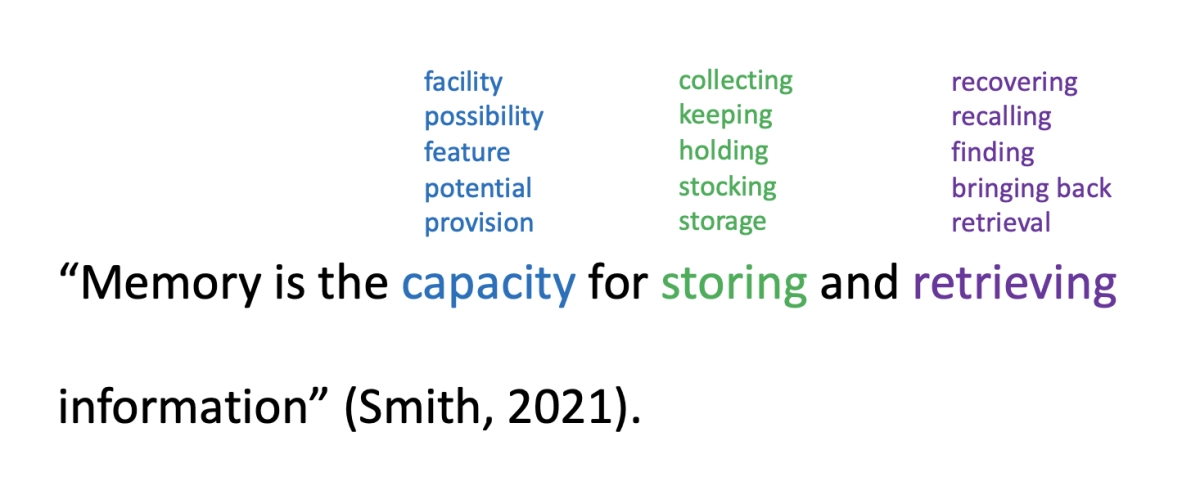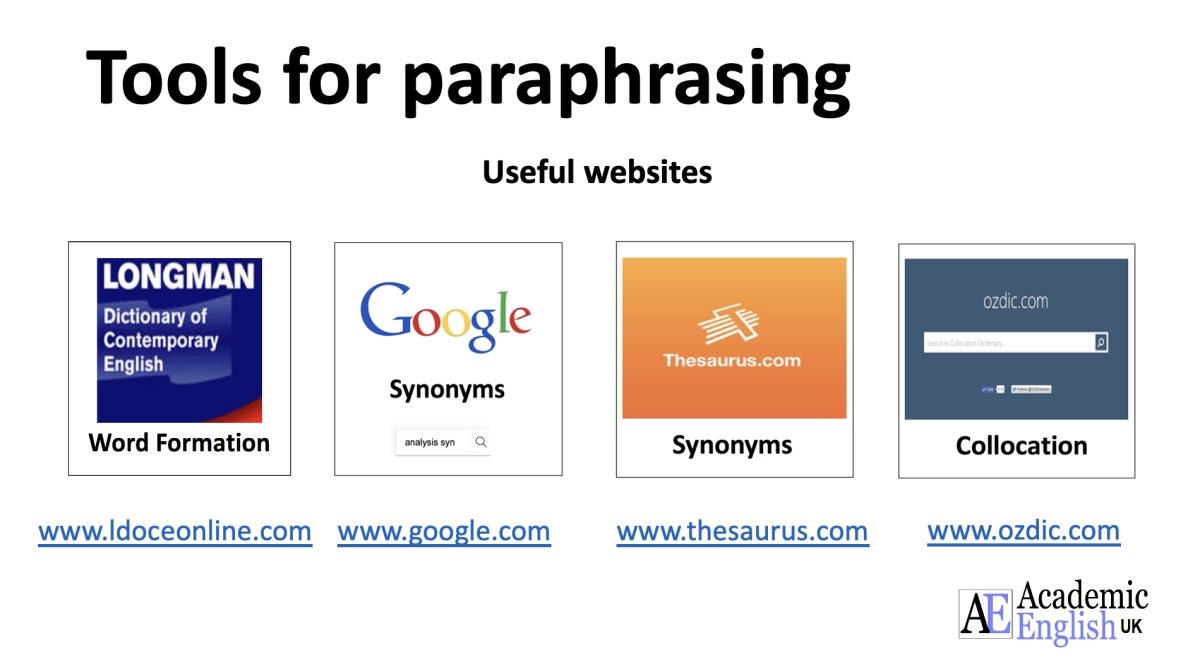Academic Paraphrasing Skills
Paraphrasing is presenting ideas and information in your own words and acknowledging where they come from. By using your own words, you demonstrate your understanding and your ability to convey this information.
Paraphrasing video
A 10-minute video on how to paraphrase effectively using the 4-key stages of paraphrasing.
What is paraphrasing?
Paraphrasing is presenting ideas and information in your own words and acknowledging where they come from. By using your own words, you demonstrate your understanding and your ability to convey this information.
- Paraphrasing shows you have a clear understanding of the topic.
- Paraphrasing ensures that the text used is relevant to your specific assignment.
- Direct copying is plagiarism. Quotation is acceptable but only when defining terms or a very central statement.
Which is a summary, quotation and paraphrase?
Poor paraphrasing.
Why is this a poor paraphrase?
Original source
“Exeter Council spends £3.3 million each year on biofuel heating rather than the £7 million it would spend if it still relied on oil and gas” (Smith, 2021, p.221).
Poor paraphrase
Smith (2021) highlights that Exeter Council pays £3.3 million every year on biofuel heating instead of the £7 million if it relied on oil and gas.
Original source
“Exeter Council spends £3.3 million each year on biofuel heating rather than the £7 million it would spend if it still relied on oil and gas” (Smith, 2021, p.221).
Poor paraphrase
Smith (2021) highlights that Exeter Council pays £3.3 million every year on biofuel heating instead of the £7 million if it relied on oil and gas.
It’s a poor paraphrase because the writer has only changed a couple of the words. If this was put through a plagiarism checker it would score a very high originality score.
Paraphrasing websites
Paraphrasing is a difficult skill and needs constant practice. However, there a range of websites to help you paraphrase words and change the sentence structure. These four websites are important for good paraphrasing. For more information go here
Key steps to effective paraphrasing
1.Highlight important words / key terms (words that cannot be changed)
2.Find synonyms / alternative words for high frequency words
3.Change grammar: sentence structure, active to passive, nouns to verbs, adjectives to adverbs, word order, etc..
4.Check meaning
Paraphrasing step by step examples (using synonyms)
Original sentence: ‘Memory is the capacity for storing and retrieving information’ (Smith, 2021).
1: Choose keywords that cannot be changed
Memory has the capacity for storing and retrieving information (Smith, 2021)
2: Find Synonyms for the other words
Memory is the capacity for storing and retrieving information.
Use Google or thesaurus.com to find a range of synonyms – like below

3. Choose the words that are similar in meaning or change the form (storing to storage)
b) Memory is the facility for storage and recovering data. [paraphrases sentence – ok]
4. Change the grammar, word forms and structure
c) Data recovery and storage are facilitated in the memory. [paraphrased sentence – very good]
Paraphrasing Lesson
 Paraphrasing Lesson 1 – how to paraphrase effectively
Paraphrasing Lesson 1 – how to paraphrase effectively
It starts by discussing the differences between quotation, paraphrase and summary. It takes students through the basics of identifying keywords, finding synonyms and then changing the grammatical structure. There is plenty of practice, all with efficient teacher’s notes. Level ***** [B1/B2/C1] Example / TEACHER MEMBERSHIP / INSTITUTIONAL MEMBERSHIP
*
 Paraphrasing Lesson 2 – improve your paraphrasing skills
Paraphrasing Lesson 2 – improve your paraphrasing skills
This lesson helps students to improve their paraphrasing skills. The guided learning approach includes a text analysis activity where students identify the paraphrasing strategies, five sentence-level tasks to practise the strategies and two paragraph-level exercises to build on the previous tasks.. Level ***** [B1/B2/C1] Example / TEACHER MEMBERSHIP / INSTITUTIONAL MEMBERSHIP
*
Writing a paragraph: Paraphrasing
This lesson provides a number of quotations based around smoking. The lesson ask students to pick three quotes, paraphrase them and write a coherent paragraph using the paraphrases. It includes a model answer. More info.
Writing a paragraph – using quotes about smoking
Students are given a worksheet with nine quotes taken from The New Scientist, BBC News, The Economist, etc… and choose only three. They use these three quotes to write a paragraph trying to paraphrase the quotes and produce a cohesion piece of writing. Level ***** [B1/B2/C1] Example/ TEACHER MEMBERSHIP / INSTITUTIONAL MEMBERSHIP
*
Free lesson: Paraphrasing quotes
Here are a range of quotations adapted from an academic text on the topic of the Environment. Take the quotations and paraphrase them into suitable sentences with similar meaning.
Paraphrasing: writing worksheet
This worksheet provides paraphrasing practice. There are five sentences taken from an academic text and students paraphrase the sentences to keep the same meaning. Includes possible answers. TEACHER MEMBERSHIP / INSTITUTIONAL MEMBERSHIP
Practice Exercise
-
Smith et al., (2010) state that ‘human activities can also change the climate.’
-
Peterson et al., (2010) point out that ‘climate is controlled by the long term balance of energy of the earth and its atmosphere.’
-
Smith et al., (2010) note that ‘winds and ocean currents redistribute heat over the surface of the earth.’
-
Jones & Smith, (2010) argue that ‘the atmospheric amounts of many greenhouse gases are increasing, especially carbon dioxide, which has increased by 30 % over the last 200 years, primarily as a result of changes in land use (e.g., deforestation) and burning coal, and natural gas (e.g., in automobiles, industry, and electricity generation).’
-
Lucus et al., (2010) mention that ‘the accumulation of greenhouse gases in the atmosphere due to human activities will change the climate by enhancing the natural greenhouse effect, leading to an increase in in the earth’s average temperature.
Paraphrasing Answers
Academic English / Paraphrasing Exercises
-
1) Smith et al., (2010) state that ‘human activities can also change the climate.’
-
It has been suggested that climate change is influenced by human activity (Smith et al., 2010)
-
2) Peterson et al., (2010) point out that ‘climate is controlled by the long term balance of energy of the earth and its atmosphere.’
-
According to Peterson et al, (2010) the lasting equilibrium of energy between the earth and the atmosphere is regulated by the climate.
-
3) Smith et al., (2010) note that ‘winds and ocean currents redistribute heat over the surface of the earth.’
-
The continuous distribution of warmth is through wind and ocean currents across the periphery of the planet (Smith et al., 2010).
-
4) Jones & Smith, (2010) argue that ‘the atmospheric amounts of many greenhouse gases are increasing, especially carbon dioxide, which has increased by 30 % over the last 200 years, primarily as a result of changes in land use (e.g., deforestation) and burning coal, and natural gas (e.g., in automobiles, industry, and electricity generation).’
-
Jones & Smith’s (2010) argument holds validity that over the last 20 years there has been a 30% increase in Greenhouse gases (CO2) due to the manipulation of the environment for the benefit of globalisation.
-
5) Lucus et al., (2010) mention that ‘the accumulation of greenhouse gases in the atmosphere due to human activities will change the climate by enhancing the natural greenhouse effect, leading to an increase in in the earth’s average temperature.’
-
Lucus et al., (2010) argue that the earth’s average temperature is increasing because of human activity through the intensification of atmospheric greenhouse gases.
More Writing Resources
More digital resources and lessons
Readings
online resources
Tests
online resources
Grammar
online resources
Medical English
online resources
New for 2024
online resources
DropBox Files
Members only
Writing
online resources
Summary
online resources
Vocabulary
online resources
Instant Lessons
online resources
Marking Criteria
online resources
OneDrive Files
Members only
Listening
online resources
Argument
online resources
Critical Thinking
online resources
Topic-lessons
online resources
Feedback Forms
online resources
6-Week Course
Members only
Speaking
online resources
SPSE Essays
online resources
Free Resources
online resources
Charts and graphs
online resources
AEUK The Blog
online resources
12-Week Course
Members only



























